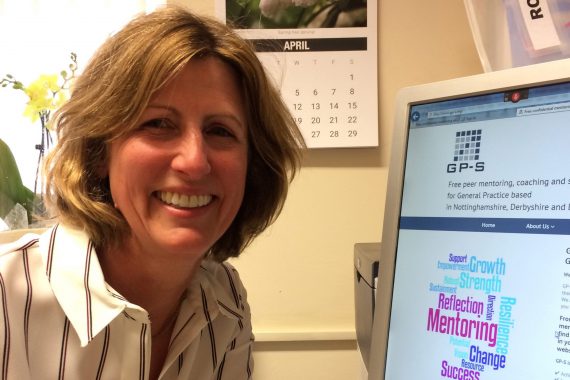GP-S is a project that was originally funded by Health Education England working across the East Midlands and NHS England locally to provide GPs, practice managers and practice nurses with free, confidential mentoring and signposting.
The service has been running since July 2015 in Derbyshire and Nottinghamshire, Lincolnshire joined GP-S in the last year. We are exploring extending the service to other areas in our region now that our model is fit to scale-up. Over 100 GPs have used the scheme so far and their feedback has been highly positive, with many who had considered leaving the profession remaining as GPs often working in a different way.
All our mentors were originally GPs – many are appraisers and/or involved in training and education. We started with ten mentors, we now have 30 because of demand.
In the last four months we have undertaken two pilot schemes with practice managers and nurses being trained as peer mentors.
In an ideal world we would offer mentoring to everyone working in primary care, however funding is limited. We have been working with doctors making career decisions at any stage of their careers. We are also there for doctors in difficulty or who are no longer enjoying work, may be feeling overwhelmed or simply that ‘something is not right’. The mentors are trained in the Egan ‘Skilled Helper Model’ which allows facilitated reflective change. We do not tell GPs what to do, they decide for themselves. We are not aimed at people who have mental health problems (the NHS GP Health programme is there to help them or we can signpost them to counselling).
We always tell appraisers about us as this is a key way GPs are signposted to our service, especially new GPs moving into the area. We’ve also been working to make appraisal itself a more supportive process rather than just box ticking.
Mentees receive up to four free two hour sessions during a six to twelve month period. It’s rare they need more than four sessions. Mentors are paid, have indemnity and receive ongoing support from GP-S through group training and supervision sessions.
As mentor lead for Derbyshire I handle all mentoring requests from potential mentees across the county who have contacted the service on-line or by phone, occasionally in person. I talk to them for about half an hour explaining more about the service and complete a pro-forma with details of what they are looking for. If we agree mentoring would be useful I match them with a mentor nearby checking there are no conflicts of interest such as knowing them socially or close working.
Since some referrals will be coping with performance issues, we ask our local team to signpost all such doctors to us for support. We also check they are registered with a GP, their level of home support and signpost to additional services such as counselling and/ or GP health.
GPs outside our area could set up similar schemes and we are happy to share our experiences with them and offer advice and resources. We feel that we have a model that allows for a ‘hub and spoke approach’.
Dr Ilona Bendefy, GP-S mentor lead for Derbyshire
A typical case
We are approached by a newly qualified GP who has taken up a salaried role in her training practice. She is willing and able but feels she is working constantly and can never get on top of her work load.
She also feels she is still treated like a trainee and does not have a voice in the practice. The partners are always too busy to talk and do a lot of work outside the practice leaving her to cope on her own much of the time. She wants to look at her work options and how to be more assertive.
The first mentoring session is talking about what’s going on and looking at her situation from lots of perspectives. She leaves to reflect on her thoughts and to decide what area she most wishes to change.
In the second session she has realised she wants to focus on how to enjoy working again and feel more confident. In the third session we look at how she is going to achieve this. She realises she needs to try working in a different environment as she feels she will always be viewed as the ex-trainee.
She decides to leave the practice and try locum work to experience different ways of working. We signpost her to the local sessional GP group for additional resources and locum support. In the fourth session several months later, later she has been working as a locum and been offered a salaried post in a regular practice where she feels more confident, is enjoying work again, has a work life balance and feels more equal to her new colleagues. She is grateful to all the help and has recommended the service to other GPs.
Details have been changed to protect confidentiality
Pulse October survey
Take our July 2025 survey to potentially win £1.000 worth of tokens













